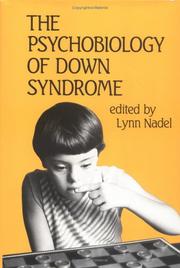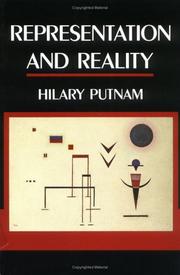| Listing 1 - 3 of 3 |
Sort by
|

ISBN: 0262140438 0262315971 9780262315975 9780262140430 Year: 1988 Publisher: Cambridge: MIT Press,
Abstract | Keywords | Export | Availability | Bookmark
 Loading...
Loading...Choose an application
- Reference Manager
- EndNote
- RefWorks (Direct export to RefWorks)
This book covers recent research with neurobiological and cognitive features of Down syndrome. This book covers recent research with neurobiological and cognitive features of Down syndrome. There has been notable progress in understanding the psychobiological concomitants of Down syndrome. New data have pinpointed selective neurological defects, and recent research has revealed that it is possible to work with the supposedly intractable, irreversible deficits accompanying Down syndrome. Surprising improvements in cognitive functions, including language, can be shown by children and even adolescents. The topics include: early concept learning in infants with Down syndrome (Jennifer Wishart); the emergence of language skills (Lars Smith), early lexical development (Caroline Mervis), and developmental asynchrony of language development in Down syndrome (Jon Miller); the use of computers with speech output to promote language use (Laura Meyers); differences between Down syndrome and normally developing children in the use of a number concept (Rochel Gelman); the neuropsychological status of older Down syndrome individuals (Krystyna Wisniewski); neuropathological (Thomas Kemper), psychobiological (Siegfried Peuschel), and neurophysiological (Eric Courchesne) aspects of Down syndrome; and the relation between Down syndrome and Alzheimer's disease (Michael Thase). The Psychobiology of Down Syndrome is included in the series Issues in the Biology of Language and Cognition, edited by John C. Marshall, and is sponsored by the National Down Syndrome Society. A Bradford Book.
Psychobiology --- -Down syndrome --- -Congresses --- Congresses --- Patients --- -Language --- -Longitudinal studies --- -21 trisomy --- Down's syndrome --- Mongolism --- Mongolism (Disease) --- Trisomy 21 --- Human chromosome abnormalities --- Mental retardation --- Syndromes --- Human chromosome 21 --- Biological psychology --- Biopsychology --- Biology --- Human behavior --- Psychology --- Biological psychiatry --- Down syndrome --- Longitudinal studies --- Language --- Down Syndrome --- Language development --- Down, Syndrome de --- Mongoliens --- Psychobiologie --- psychology --- congresses. --- Congresses. --- Congrès --- Langage --- Etudes longitudinales --- Language Development --- 21 trisomy --- Intellectual disability --- Patients&delete& --- Language&delete& --- Longitudinal studies&delete& --- Down syndrome - Congresses --- Down syndrome - Patients - Longitudinal studies - Congresses --- Psychobiology - Congresses --- Down syndrome - Patients - Language - Congresses --- COGNITIVE SCIENCES/General --- BIOMEDICAL SCIENCES/General

ISBN: 0262660741 0262161087 026228197X 0585021228 9780585021225 9780262161084 9780262281973 9780262660747 Year: 1988 Publisher: Cambridge, Mass. MIT Press
Abstract | Keywords | Export | Availability | Bookmark
 Loading...
Loading...Choose an application
- Reference Manager
- EndNote
- RefWorks (Direct export to RefWorks)
Hilary Putnam, who may have been the first philosopher to advance the notion that the computer is an apt model for the mind, takes a radically new view of his own theory of functionalism in this book. Putnam argues that in fact the computational analogy cannot answer the important questions about the nature of such mental states as belief, reasoning, rationality, and knowledge that lie at the heart of the philosophy of mind.
Theory of knowledge --- Realism. --- Mind-brain identity theory. --- Functionalism (Psychology) --- Truth. --- Reference (Philosophy) --- Mathematics --- Computers. --- Philosophy. --- Functionalism (Psychology). --- Reference (Philosophy). --- Computers --- Mind-brain identity theory --- Realism --- Truth --- Conviction --- Belief and doubt --- Philosophy --- Skepticism --- Certainty --- Necessity (Philosophy) --- Pragmatism --- Referring, Theory of --- Theory of referring --- Empiricism --- Universals (Philosophy) --- Conceptualism --- Dualism --- Idealism --- Materialism --- Nominalism --- Positivism --- Rationalism --- Brain-mind identity theory --- Brain --- Mind and body --- Functional psychology --- Psychology --- Automatic computers --- Automatic data processors --- Computer hardware --- Computing machines (Computers) --- Electronic brains --- Electronic calculating-machines --- Electronic computers --- Hardware, Computer --- Computer systems --- Cybernetics --- Machine theory --- Calculators --- Cyberspace --- Logic of mathematics --- Mathematics, Logic of --- Philosophy & Religion --- Math --- Science --- COGNITIVE SCIENCES/General --- PHILOSOPHY/Philosophy of Mind/General --- Mathematics - Philosophy.

ISBN: 026207107X 0262315939 9780262315937 9780262071079 0262570912 9780262570916 Year: 1988 Publisher: Cambridge (Mass.) : MIT press,
Abstract | Keywords | Export | Availability | Bookmark
 Loading...
Loading...Choose an application
- Reference Manager
- EndNote
- RefWorks (Direct export to RefWorks)
Stephen Grossberg and his colleagues at Boston University's Center for Adaptive Systems are producing some of the most exciting research in the neural network approach to making computers "think." Packed with real-time computer simulations and rigorous demonstrations of these phenomena, this book includes results on vision, speech, cognitive information processing; adaptive pattern recognition, adaptive robotics, conditioning and attention, cognitive-emotional interactions, and decision making under risk.
AI(Artificial intelligence) --- Circuitry [Neural ] --- Circuits [Neural ] --- Human intelligence --- Intelligence [Artificial ] --- Nerveux [Réseau ] --- Net [Zenuw] --- Neurale computers --- Ordinateurs neuraux --- Réseau nerveux --- Thinking [Artificial ] --- Verstand --- Zenuwnet --- Ordinateurs neuronaux --- Synaptic Transmission. --- Transmission, Neural --- Transmission, Synaptic --- Neural Transmission --- Neurotransmission --- Neural Conduction --- Synapses --- Neurale netwerken --- Intelligentie. --- Cerveaux électroniques --- Machines intelligentes --- Pensée artificielle --- Intelligence --- Artificial intelligence --- Intellect. --- Neural computers --- Neural networks (Computer science) --- Neural circuitry --- Intelligence artificielle --- Réseaux neuronaux (Informatique) --- Réseaux nerveux --- Intellect --- Synaptic Transmission --- #TELE:SISTA --- Artificial neural networks --- Nets, Neural (Computer science) --- Networks, Neural (Computer science) --- Neural nets (Computer science) --- Natural computation --- Soft computing --- Mind --- Ability --- Psychology --- Thought and thinking --- AI (Artificial intelligence) --- Artificial thinking --- Electronic brains --- Intellectronics --- Intelligence, Artificial --- Intelligent machines --- Machine intelligence --- Thinking, Artificial --- Bionics --- Cognitive science --- Digital computer simulation --- Electronic data processing --- Logic machines --- Machine theory --- Self-organizing systems --- Simulation methods --- Fifth generation computers --- Neural net computers --- Neural network computers --- Neurocomputers --- Electronic digital computers --- Cognitive psychology --- Artificial intelligence. Robotics. Simulation. Graphics --- Computer architecture. Operating systems --- Artificial intelligence. --- Neural computers. --- Neural networks (Computer science). --- Geheugen. --- Neurale netwerken. --- Intelligence. --- Réseaux neuronaux (physiologie) --- Apprentissage automatique. --- Sciences cognitives. --- Neural networks (Neurobiology) --- Machine learning --- Brain. --- Cerebrum --- Central nervous system --- Head --- Computer systems compared with --- human brain --- Man --- Brain compared with --- computer systems --- COGNITIVE SCIENCES/General --- COMPUTER SCIENCE/Machine Learning & Neural Networks --- Réseaux neuronaux (physiologie)
| Listing 1 - 3 of 3 |
Sort by
|

 Search
Search Feedback
Feedback About UniCat
About UniCat  Help
Help News
News